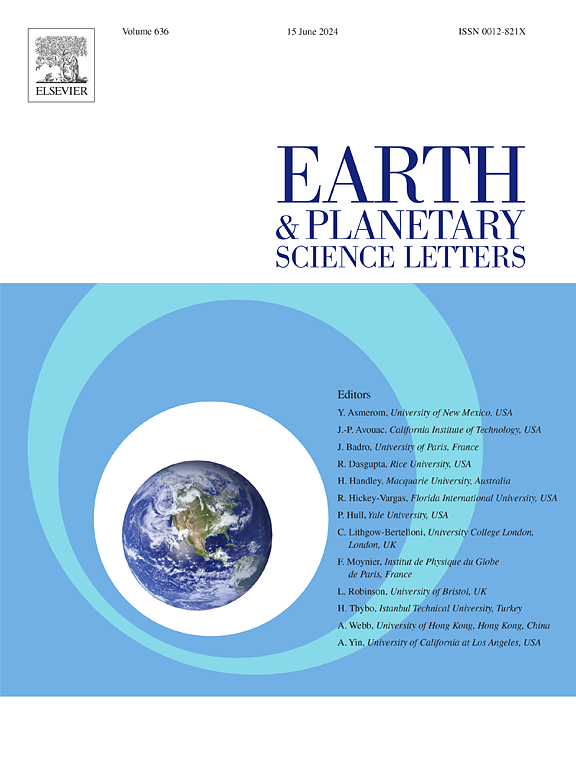Magmatic degassing dynamics at Halema'uma'u Crater, Kīlauea, Hawaii
IF 4.8
1区 地球科学
Q1 GEOCHEMISTRY & GEOPHYSICS
引用次数: 0
Abstract
Lava lake activity within Halema‘uma‘u crater on Kīlauea volcano, Hawaii, between 2010 and 2018 provided a remarkable opportunity to observe the dynamics of magmatic degassing occurring in both quiescent and lava-spattering degassing regimes. We collected open-path FTIR absorption spectra of magmatic gas in December 2015, when distributed lake surface degassing and spattering activity occurred on the SE margin of the lava lake. We quantified seven volcanic gas species, H2O, CO2, SO2, HCl, HF, CO and OCS, distinguishing between spattering and lake surface degassing. Passive and solar traverse measurements allowed quantification of compositions and relative SO2 emission rates of 60 % from spattering and 40 % from lake surface degassing. Spattering gas has a CO2/SO2 molar ratio of 0.88 compared with 0.56 for lake surface degassing, consistent with a partial sulphur loss from magma during spattering. We propose that spattering is the result of continuous formation of coalescing gas bubbles driven by downwelling lava lake crust, which promotes gas loss from 10s-100 s of metres within the lake. Spattering degassing provide a mechanism for partial degassing of magma within the Halema‘uma ‘u lava lake, and production over time of a large volume of partially degassed magma. This is in agreement with petrological models indicating that summit-derived partially degassed magma accumulated in the MERZ in the decade prior to the 2018 LERZ eruption. Calculations of equilibrium temperature and redox state are consistent with gas-rock buffering.
夏威夷基劳埃阿火山口的岩浆脱气动力学
2010 年至 2018 年期间,夏威夷基劳埃亚火山哈莱马乌玛火山口内的熔岩湖活动为观察静态和熔岩喷溅脱气状态下的岩浆脱气动态提供了难得的机会。我们在 2015 年 12 月采集了岩浆气体的开路傅立叶变换红外吸收光谱,当时熔岩湖的东南边缘出现了分布式湖面脱气和喷溅活动。我们量化了七种火山气体:H2O、CO2、SO2、HCl、HF、CO 和 OCS,区分了喷溅和湖面脱气。通过被动测量和太阳横移测量,我们可以量化成分和相对 SO2 排放率,其中 60% 来自喷溅,40% 来自湖面脱气。喷溅气体的二氧化碳/二氧化硫摩尔比为0.88,而湖面脱气的摩尔比为0.56。我们认为,喷溅是熔岩湖地壳下涌推动凝聚气泡不断形成的结果,它促进了湖内 10s-100s 米处的气体流失。喷溅脱气提供了哈雷马乌玛熔岩湖内岩浆部分脱气的机制,并随着时间的推移产生了大量部分脱气的岩浆。这与岩石学模型一致,表明在2018年LERZ喷发前的十年中,来自山顶的部分脱气岩浆在MERZ中积累。平衡温度和氧化还原状态的计算与气体-岩石缓冲作用一致。
本文章由计算机程序翻译,如有差异,请以英文原文为准。
求助全文
约1分钟内获得全文
求助全文
来源期刊

Earth and Planetary Science Letters
地学-地球化学与地球物理
CiteScore
10.30
自引率
5.70%
发文量
475
审稿时长
2.8 months
期刊介绍:
Earth and Planetary Science Letters (EPSL) is a leading journal for researchers across the entire Earth and planetary sciences community. It publishes concise, exciting, high-impact articles ("Letters") of broad interest. Its focus is on physical and chemical processes, the evolution and general properties of the Earth and planets - from their deep interiors to their atmospheres. EPSL also includes a Frontiers section, featuring invited high-profile synthesis articles by leading experts on timely topics to bring cutting-edge research to the wider community.
 求助内容:
求助内容: 应助结果提醒方式:
应助结果提醒方式:


